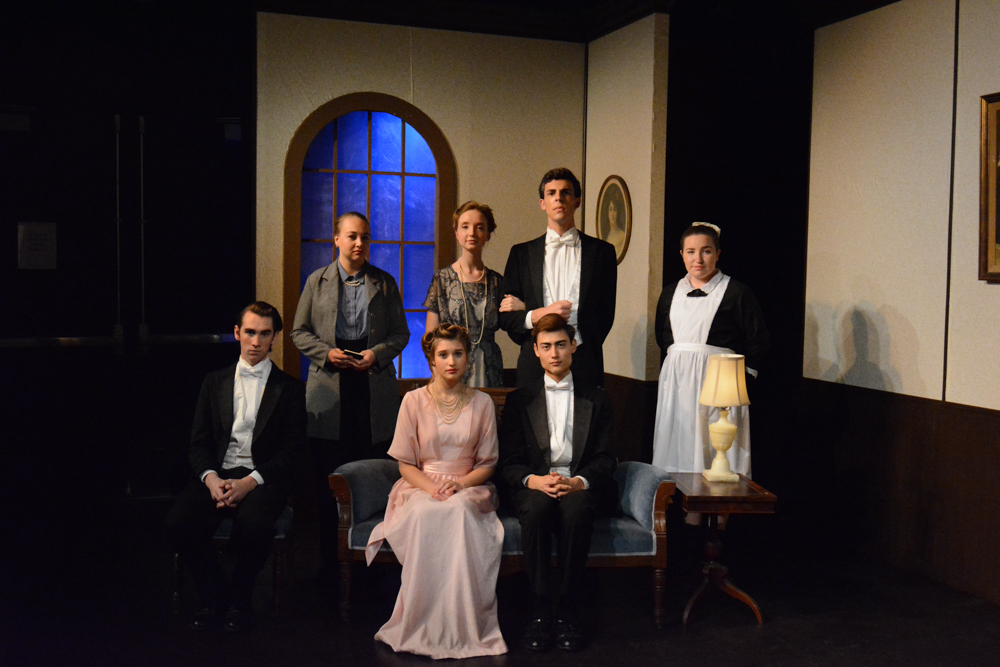This spring, Biola’s Theatre 21 delves into psychological drama in their production of “An Inspector Calls” by J.B. Priestly. Directed by Kate Brandon, associate professor of theatre, the show follows the story of a mysterious police inspector who interrogates an upper-class family.
Powerful messages
“An Inspector Calls” premiered in 1944 as a three-part drama and has experienced a recent surge in popularity following Stephen Daldry’s 1992 revival. The play is a critically acclaimed example of “drawing room” theater, where all scenes take place in the drawing room of the family’s home. Rather than focusing on an elaborate setting, it delves further into the details of the story’s mystery.
Taking place in 1912 England, the play focuses on the wealthy Birling family and their various motivations. When a mysterious Inspector Goole visits them by surprise, the members of the family are forced to recognize their possible guilt regarding the death of a young working-class woman. When the drama was written it originally stood as a criticism of the problems with Victorian English society. However, many of the themes in the play remain culturally relevant, such as the treatment of outsiders or the way people deal with personal faults.
“Even though the play is based in the 1900s… I really appreciate the way that it has some really powerful messages that still apply to society today,” said Shannon Rossilli, freshman communications major who plays Inspector Goole. “I think that’s a really cool thing, when a play can tie things from history into what’s happening presently.”
Biola’s production of “An Inspector Calls” focuses on the emotional impact of the story through the exploration of each character, including the prideful father Arthur Birling, the poised mother Sybil, the rebellious son Eric and the sympathetic daughter Sheila. Inspector Goole is an assertive and sharp woman in this interpretation despite traditionally being a male role.
While the play’s scope is on the smaller side, its execution is more personal and sincere. The atmosphere when uncovering the mystery is appropriately tense, keeping the audience invested in the drama. With a focus on moral ambiguity, the play suggests a variety of themes which leave the audience with answers as well as new questions.
Emotionally heavy
Such an emotionally heavy play requires a large amount of dedication from the actors, including connecting personally with a character.
“Playing Arthur Birling has been hard because there are a lot of ways that he’s different from me,” said Andy Marderian, sophomore English and theatre double major. “I’ve had to discover similarities in places where we do overlap, so in that way I could know him better and better step into his shoes.”
The process of learning and rehearsing the play started in early February and continued through April. In order to fully develop the play, the cast had to refine many different aspects of the story and performance.
“The first couple weeks were a lot about understanding the play itself,” Marderian said. “Once we made that intellectual step, that’s when we started getting the more physical element, just being on stage and figuring out our movements. After that came the emotional, where I think we’ve really hit our stride a lot more.”
With a relatively small production, the bond of the cast and crew was a valuable part of the experience. The trust between each member is apparent through their hard work as a unified group.
“With it being such a small cast, there’s a lot more opportunities to really get to know every single person and have a deep familial love for everyone,” said Paul Davis, freshman English and film major who plays Eric Birling.
relatable and poignant
The devotion that went into the play translates into a detailed and concentrated performance that influences the audience. The themes of the production similarly encourage viewers to form a unique connection with personal struggles and modern-day issues.
“I want people to know that it is relatable and poignant,” Marderian said. “It really hits home and a lot of it is still applicable now.”
“An Inspector Calls” will show on April 15-16 at 8 p.m., April 17 at 3 p.m., April 21-23 at 8 p.m. and April 24 at 3 p.m. in Theatre 21 on the McNally campus. Tickets are $7 for students, $10 for faculty and $12 for general admission.







